You can also listen to this episode on Spotify!
Human suffering is impossible to fully measure. It includes our core values and beliefs. It encompasses our tolerance for pain. If medical decision-making is about avoiding risk, who gets to decide what’s even worth risking? If avoiding one risk means adding another, when are we doing “no harm”?
Doctors can measure blood pressure, blood sugar, liver enzymes, and white cells; we can even run genetic profiles to look for elevated risks for cancer (like the BRCA gene mutations). But there is no blood test for depression, no MRI for chronic pain, no line in the sand separating worry from debilitating fear.
In this episode, Dr. McBride discusses how modern medicine tends to discount things it cannot see — and how to better advocate for ourselves in the doctor’s office.
Join Dr. McBride every Monday for a new episode of Beyond the Prescription. You can subscribe on Apple Podcasts, Spotify, or at lucymcbride.com/podcast.
Get full access to her free weekly Are You Okay? newsletter at https://lucymcbride.substack.com/welcome
Please be sure to like, rate, review — and enjoy — the show!
The transcript of the show is here!
Dr. Lucy McBride: Hello, and welcome to my home office. I'm Dr. Lucy McBride, and this is "Beyond the Prescription". Today, it's just you and me. Every other week this season, I'll talk to you like I do my patients, pulling the curtain back on what it means to be healthy, peeling back the layers of everyday medical problems I see. In clinical practice for over 20 years, I've found that patients generally want the same things. A framework to evaluate their risks, [00:00:30] access to the truth and the courage to face it, and tools and actionable information to be healthy mentally and physically. So, whether it's managing weight, cholesterol, cancer, or mental health issues, we all want to feel more in control of our health. Here, I'll talk to you about how to be a little more okay tomorrow than you are today, and how to be healthy from the inside out. Let's go.
Today, dear listeners, I'd like to talk to you about how we do [00:01:00] such a bad job in the modern medical landscape at addressing the invisible suffering people experience. What do I mean by this? I read this article that you probably read in the New York Times, on February 1st, 2023. It was a fantastic article, written by Susan Dominus. The title, "Women Have Been Misled About Menopause." When I first read the article, I was honestly speechless. I was delighted but I was also kind of shocked that the mainstream media are finally recognizing [00:01:30] the invisible toll on women from the absence of hormones. I'm gonna get to the substance of that article in a minute. But the takeaway from that article, which I really encourage you to read, and I'll link it in the show notes, is not so much that women should be given nuanced information about hormone replacement therapy around menopause. They should. It's more that this article represents another example of modern medicine's inability to countenance things we cannot measure, [00:02:00] things we cannot see. In other words, as I talk about commonly, there are lots of things we can measure. We can measure cholesterol, we can measure blood pressure, we can measure genetics, you know, we can measure predispositions towards genetic phenomena. What is harder to quantify but no less important is the everyday suffering that people experience. And it's not just about menopause.
Let's think about other subjects in which we cannot quantify suffering. Let's talk about mental health. There's no blood test, there's no MRI [00:02:30] for depression. There is no line in the sand that separates anxiety that's unhealthy from anxiety that is "normal". Let's talk about COVID-19 and our response to it. We, for good reason, protected, at all costs, against COVID-19 in 2020, when we didn't know what was going on, we saw people dying, vulnerable people in nursing homes particularly vulnerable. But we also, [00:03:00] in my humble opinion, failed to acknowledge, over time, as more information and data was collected, and as we had extraordinary vaccines, we failed to zoom out and recognize that health is about more than the absence of COVID-19. In other words, not having COVID is great. But health is also about being in the classroom, seeing the faces of your teachers, participating in social activities. Particularly for young minds and for older people, [00:03:30] social interaction is crucial. But those are not measurable. There's no PCR test for despair. In other words, it's much easier to defend against the enemy that we can see than it is to protect against the things we can't see.
Here's another example of where we don't do well in this department. By the way, this is not gonna be a depressing podcast episode, although if you're depressed, you know, fine. I have lots of thoughts and ideas on how we can mitigate this problem, [00:04:00] from a societal level and on an individual level. But another area in which we see this problem where we don't countenance the invisible is in conversations about death and dying. I have the honor of being part of these conversations. My patients who have terminal illnesses, my patients who are elderly and infirm, they have accumulated medical conditions, none of which is going to necessarily take them, but we know that given their age and their comorbidities, that they have, you know, less than two years, less than five years to live. [00:04:30]
The way I approach these conversations with families and the patient is not by helping them decide on a menu which medicine, which medical procedure they want, at which time and which day, because guess what? We can't predict the future. We don't have a crystal ball on how everything is going to go in the last days, months, years of life. So, instead of asking people, "Do you wanna be on a ventilator? Do you want dialysis? Do you want aggressive measures, you know, at the end of your life?" I instead frame the question in a different way. What gives you meaning in your life? [00:05:00] In other words, let's center life in the question instead of death. Let's center your values as a way to pressure-test our decisions moving forward about interventions like feeding tubes or dialysis.
Let's take an example. And my friend Eleanor Tanno, who's a physician in the D.C. area, and a good friend of mine, has written me a guest post for my newsletter about this very issue. As she says, you know, when she's talking to patients and families about end-of-life decisions, how can
you decide on what you want for dinner [00:05:30] when you don't even know what's on the menu? In other words, when we're thinking about end-of-life decision-making, planning ahead, we wanna ask the patient, what is it you live for? And what are the things that you consider a bare minimum for a quality of life? And if your quality of life is contingent on being able to read the New York Times, listen to Beethoven, or know your grandchildren's names, any medical intervention that we're deciding on that's not gonna restore those faculties [00:06:00] is something we should spare you.
Because at the end of the day, we do harm by prolonging life that's not quality. Then this gets back to my original point that we don't do a good job of measuring things we cannot see. It is harder to measure the value someone places in the ability to identify music they hear on the
radio than it is to quantify their EKG, their heart rate, their blood pressure. Whether we're talking about menopause, and the absence of hormones, [00:06:30] and the unmeasurable suffering, like hot flashes and night sweats, sexual dysfunction, low sexual desire, loss of muscle tone in the pelvic floor, or whether we're talking about the despair that existed during the pandemic and that still does, or whether we're talking about people's core values or the way they value life, we have to do better as doctors, and as a society, having those conversations. Talking about feelings, talking about values, talking about goals, [00:07:00] and talking about what gives us pain and what gives us pleasure. For every pain we experience, we have to marry that with pleasure.
In other words, we need to talk about quality of life just as much as quantity. Now, quantity of life is why we go to medical school. We're there to help people live long. But I don't see it that way as I've seen patients for 22 years. Of course, my job is to help people live as long as they can. But health is about more than just not dying. [00:07:30] Health is about living. And it's about living on people's own terms. It is not appropriate for me to set the agenda for someone's life. It's not even appropriate, in my humble opinion, to help prolong someone's life if their quality of life is not what they would want. In other words, in the modern era, I can help someone not have a heart attack, not have a stroke, not get breast cancer, or detect it really early, and I can help people live to their 95, 100. That's the benefit of modern medicine. [00:08:00] But at what cost?
Now, don't go home to your spouse or your partner or your child and say, "Gosh, this Dr. McBride on her podcast is advocating for premature death." Not at all. What I'm advocating for is a thoughtful zooming-out on what it means to be alive. What are the key elements that you need to feel healthy? Who are the people in your life that you trust? What are the things that feed your soul? Is it going to the opera? Is it playing bridge with your friends? Is it having a cup of tea [00:08:30] with a neighbor? Is it your cat? Is it your writing? Is it your art? Is it your profession? Is it your children? What is it that gives you meaning, and lean into those things. What is it that gives you pain? Is it your arthritic hip? Is it grief? Is it depression that has bled into fatigue, despair, and hopelessness? Those count. Those matter in a decision-making rubric when you're in the doctor's office. [00:09:00] Those should matter when you're making a decision about any medical intervention or any decision in your life, whether it's medical or not.
In other words, the way I would hope medicine to evolve over time is to meet people where they are, not to use my personal risk tolerance as a doctor to inform our decisions. And certainly, not to inform a narrative in the public square, to inform a public health policy or a decision not to give someone hormone replacement therapy [00:09:30] when they deserve to have that conversation. Going back to the hormone replacement therapy for a minute, because I'm sure you'll have questions, not every woman needs to be on hormone replacement therapy. Not every woman should be on hormone replacement therapy.
What the article is talking about, finally, is what doctors have known for a long time, which is that for most women, within 10 years of their last menstrual cycle, the benefits of hormone therapy generally outweigh the risks. Of course there's nuance, and that's why you need to talk to your own doctor. [00:10:00] When we're talking about COVID-19, of course we wanna protect against COVID. Of course, no one wants to get sick. No one wants to be in the hospital. No one wants to lose a loved one to COVID-19. Of course. But we can do both. We can actually protect against COVID by getting vaccinated and boosted if necessary, and by working on our underlying conditions, and by framing our risk of COVID in the context of our whole lives.
In other words, yes, we wanna protect against COVID. No one wants to get sick, no one wants to miss school or work. No one wants to get very sick. [00:10:30] No one wants to end up in the hospital or die from COVID-19, of course. But in the vaccine era, that risk has been so well-mitigated that it's appropriate now, as it has been for a long time, to think about health in a broader way. Again, health includes seeing friends, socializing, and living our normal lives, to the extent life is normal at all in the modern era. And last, when we think about end-of-life care, it's less appropriate to think about what metrics and what tests and procedures we want [00:11:00] than it is to center our decisions on quality of life and values.
Now, this may all sound very vague to you, and it should, because what I'm talking about is a framework. I'm not talking about specific medical advice. All I ask is that you consider for a minute what it means to you to be healthy. I talked about that a bit in my first podcast. I talked about the integrated sum of four "I"s. And now I'd ask you to think one click over, and ask yourself, when you're making a medical decision, [00:11:30] to take cholesterol medication or not, to take hormone replacement therapy or not, to decide on a more aggressive intervention or a more conservative intervention, I would make sure that you're using your North Stars, your instinct, your desires, your wants, and your tolerance for risk, as a guide, and not your doctor's or the public narrative. All decisions, in my humble opinion, should be rooted in medical evidence and facts, [00:12:00] and the patient's story. That's my public service announcement.
I'll just end by saying this. I hope that my own children, and I hope that your children grow up in a medical landscape in this country where people are seen, people are heard, and when there's an acknowledgement that our stories live in our bodies, and that the best medicine happens when we marry medical evidence with a patient's own narrative. So, I might be dead before that happens [00:12:30] and before there's universal access to primary care, with behavioral and mental health woven into it. But in the meantime, I hope you'll keep listening. I hope you'll follow along with me. My passion for discussing these kinds of issues is endless. Sometimes I exhaust myself, but I think it's really important to empower people with framework around which to make complicated decisions, to give people permission to feel and to think for themselves, and to help them understand [00:13:00] where to find the data. Because look, everyone's a guru these days. We have a gururification of the public square. And I'm not saying I know everything. Please ask my children. I don't. But I just want you to be aware that it's important to have access to the facts, to people you trust, to nuanced information, and for you to be in the driver's seat of your health, and no one else. I hope that makes sense, I hope that's helpful, and I'll see you next week.







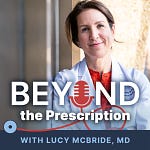
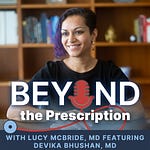

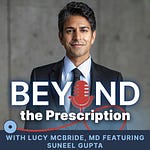
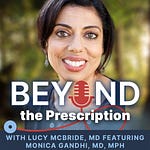
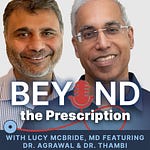
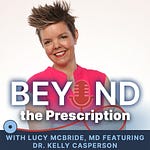
Does Invisible Suffering "Count" in the Doctor's Office?